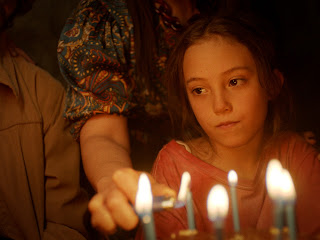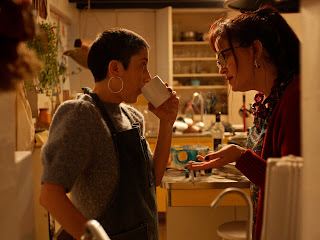Filmed over the course of five weeks in Brussels, Alexis Langlois' feature debut Queens of Drama is a reflection on the dualistic nature of fame and the often rocky journey artists undergo in their pursuit of success. This Belgian co-production has already screened at several film festivals, including London and Gent, and it plays at BFI Flare on Wednesday. Often more odious than melodious, this shrill musical drama follows Mimi Madamour (Louiza Aura) and Billie Kohler (Gio Ventura), two young women who audition for a cutthroat singing reality TV series that bears more than a passing resemblance to The Voice.
Mimi is selected in the competition and goes on to enjoy a glittering pop career, one largely built on anodyne smash hit "Don't Touch", while Billie is rejected by the show but carves out a name for herself in the underground punk scene. Langlois weaves a star-crossed romance between these contrasting characters, who make a connection (of sorts) during their brief time together on the TV show. Also looming large in the story is Mylène Farmer-esque pop star Magalie Charmer (Asia Argento), whose stint at the apex of mainstream music serves as a blueprint for Mimi, who seeks to emulate this stalwart performer's success and longevity.
Despite the very different paths taken by Mimi and Billie, they don't lose track of each other, and the film charts the peaks and troughs of their careers and relationship; a song is never too far away as Langlois attempts to prop up a sagging narrative with musical interludes fashioned by the likes of Yelle, Pierre Desprats, and Louise BSX. Ultimately, Queens of Drama buckles under the weight of its near two-hour running time, which is padded out by highly repetitive sequences, many of which feature onetime Eurovision contestant Bilal Hassani, who gets way too much screen time as tiresome stan Steevyshady.
Hassani commandeers the film's opening scene in a manner that might sink the hearts of many viewers who, like me, wrongly conclude that they'll have to endure 114 minutes of his grating character; mercifully, Steevy soon makes way for the two protagonists, with the role subsequently functioning more or less as that of a Greek chorus. Queens of Drama isn't all bad—game newcomers Ventura and Aura both deliver brave, committed performances, and the film is nearly always visually interesting, largely on account of its Day-Glo colour palette—but at least half an hour of it should have been left on the cutting room floor.






















































